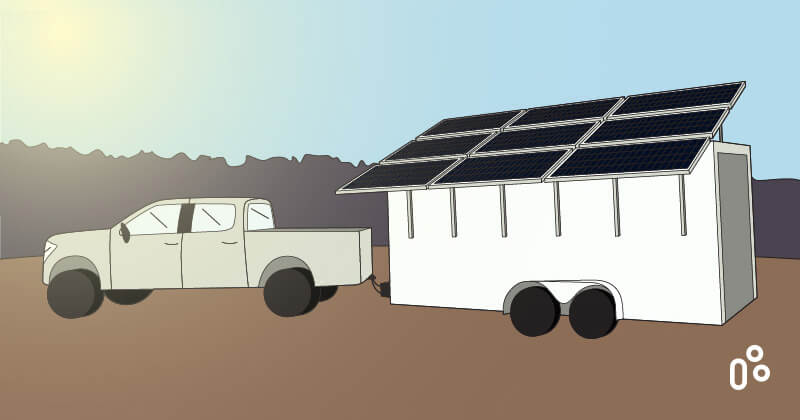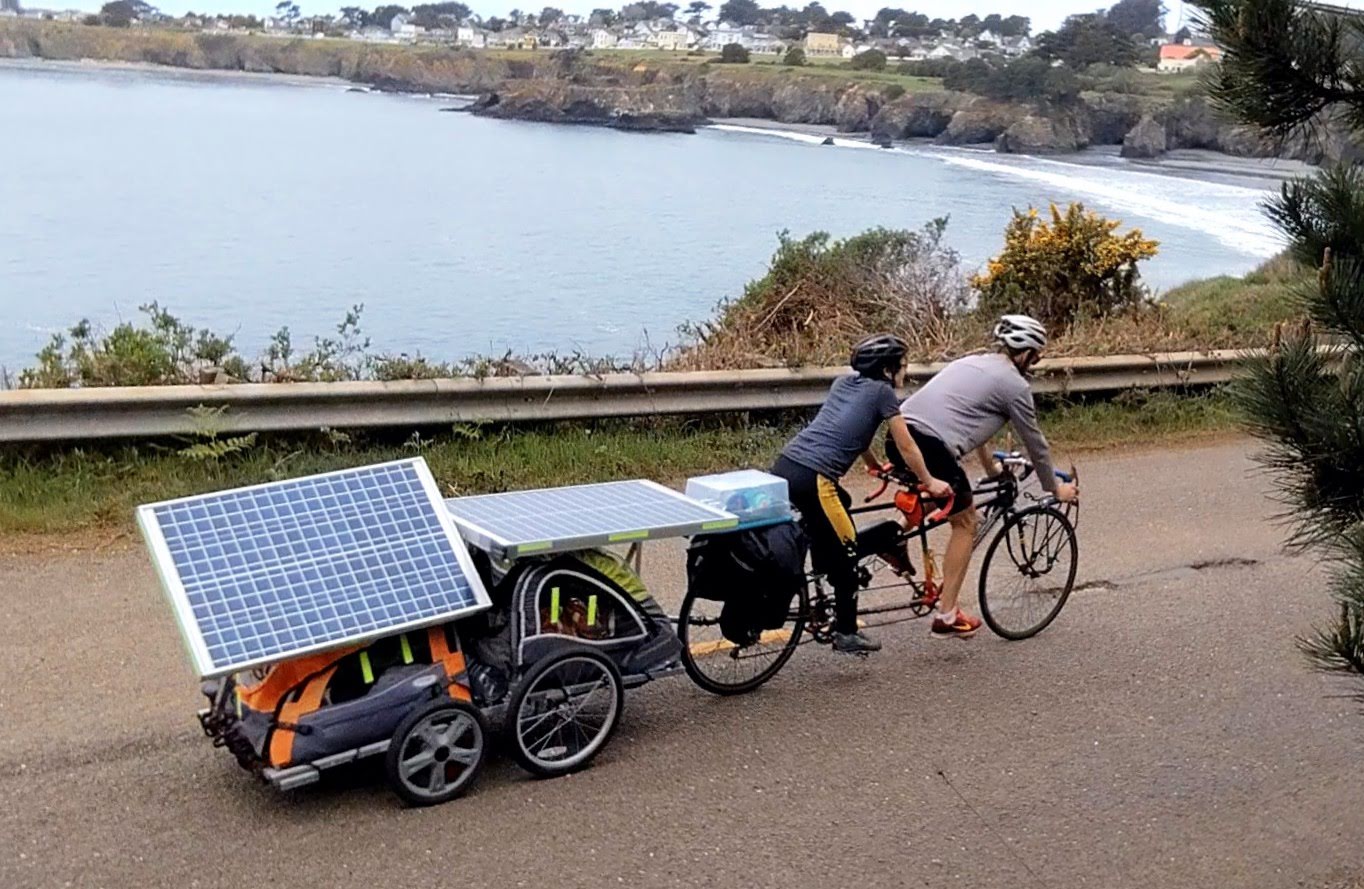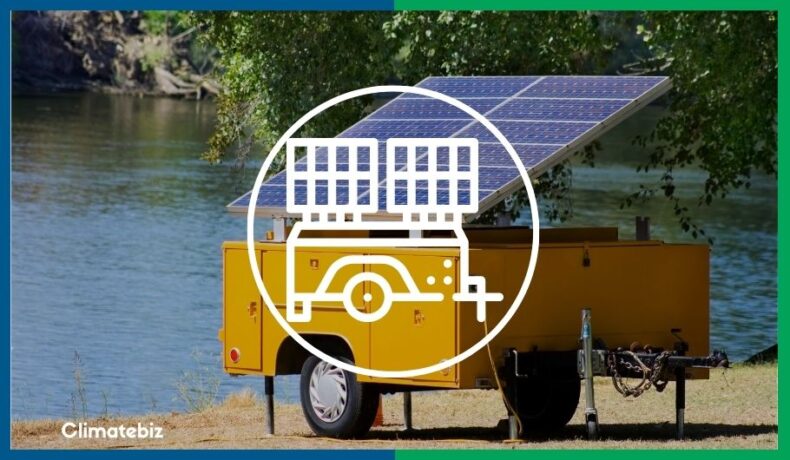So you finally decided to go with a solar trailer.
No doubt that at this stage, you’ve been through a ton of research, weighing the pros and cons of a trailer versus motorhomes, and finally choosing to go with the former.
Now, you’re looking to install a solar system to enjoy FREE, clean energy while on the road.
While there are plenty of similarities between RV solar roofs and solar trailers in terms of setup, the main difference between the two is the ability for your trailer to be placed in a different spot from your tow truck or vehicle.
Having a trailer that you can use to harvest solar while being able to park your tow truck in the shade is one of the main advantages of solar trailers.
Trailers are also more budget-friendly compared to owning a motorhome. They cost less and are more compact; therefore, they are cheaper to maintain and operate. However, they are harder to maneuver and force you to pack light.
But we aren’t here to get into the nitty-gritty of the pros and cons of a trailer.
Rather, we’re focusing on what you need to know when integrating solar into your trailer.
We’ll take a deep dive into the factors that you’ll need to take into consideration, such as cost, operating principles, sample use cases, among others.
Now, let’s take a closer look at what a solar trailer is.
Table of Contents
What Is A Solar Trailer?
So what exactly is a solar trailer? Let’s break down the term into its base words and find out.
The word “solar” is a base word that refers to the radiant light and heat from the sun. In the context of green energy, it’s commonly used as a word to describe an object (e.g., panel, RV, boat, home, trailer, etc.)
On the other hand, a “trailer” is an unpowered vehicle towed by another. This is its main difference from an RV which falls under the category of a “motorhome.”
Therefore, we can conclude that a “solar trailer” is an unpowered vehicle that can harness solar energy.
Common Solar Trailer Setup Types
By and large, there are two common ways to set up your solar trailer.
Solar Trailer Type 1
The first option is to put the solar panels directly on the trailer (see image below). The main advantage of this layout is simplicity. You park your solar trailer out in the open and let it soak in all that solar energy to power your devices.

Source: TiMOTION
However, you have to deal with the heat on hot days if you plan to stay in your trailer while harvesting solar.
Solar Trailer Type 2
The second option addresses the problem above. In this setup, the solar panels of your trailer are portable and can be placed far away from the trailer. This allows you to use solar as you produce it while parking your solar trailer in the shade.

The primary considerations you need to look out for when going with the latter are wiring and solar panel type. We recommend long, low impedance/resistance wires that are appropriate for the size of your panels. Purchasing foldable panels with stands is also good in this case since you want your panels tilting around 30 to 45 degrees.
Here is an idea: You could opt to place the solar panel on your tow truck and have it parked under the sun while your trailer lies in the shade.
And yes, we know that the image below is a bit awkward. But hey, you get the concept, and that’s all that matters.

How Does a Solar Trailer Work?
Now that you know the basics, let’s figure out how a solar trailer works.
A solar trailer works the same as any off-grid solar system setup. Photovoltaic cells directly convert solar energy into electricity to run gadgets and appliances.
Of course, some of you already know this fundamental operating principle of solar panels. The next question we often get after the “how” is the “how much or how many.”
“How many solar panels do I need?”
“How much are solar panels? Which ones are good?”
Plenty of personal considerations go into this, and it’s easy to feel overwhelmed. Don’t worry, though. We’ll go through them one by one.
What Can A Solar Trailer Power?
It’s probably obvious to some, but the answer to the question “What can a solar trailer power?” depends on what you intend to run while on the road.
Solar Trailers In Real Life
But, let’s set some expectations. You cannot expect to run many appliances on solar alone.
Well, you could, but it wouldn’t be practical.
This is because solar panels aren’t compact enough to run large loads.
They’ve come a long way in terms of portability efficiency and continue to do so. All we can do is wait until that day comes.
Usually, the purpose behind purchasing a solar trailer is to keep the batteries topped off for running the little things.
High Capacity Solar Trailer Setup
But for those who really push the issue, we recommend getting a combination of:
- Flexible solar panels (lightweight and ultrathin)
- Long-duration lithium-ion energy storage (expensive but stores a lot of energy while maintaining a compact and portable design)
- MPPT solar charge controller (regulates voltage and current to protect your entire system, and charges your battery fast)
- High power pure sine wave inverter (2 to 3 kW should do the trick to run a “small home” ).
A decent and complete solar trailer setup should look like the image below
However, we still recommend not to include airconditioners on your list.
In general, almost nobody tries to run an air conditioner off of solar. In our opinion, if you’re looking to combat the heat, a power hookup is the way to go.
Solar Trailer Sizing Example
Let’s determine what solar trailer size can power which appliances through an example.
| Typical Appliances | Rated (Running) Watts | Hours Used | Energy needed |
| Small Coffee Maker | 600 W | 0.25 hours | 150 watt-hours |
| Microwave | 800 W | 0.25 hours | 200 watt-hours |
| Mini Refrigerator / Freezer | 400 W | 24 hours | 3,200 watt-hours |
| Laptop and Cellphone | 100 W | 5 hours | 500 watt-hours |
| Lightbulbs | 100 W | 4 hours | 400 watt-hours |
| Total Solar Panel Size | 2,000 watts or 2 kilowatts | 4,450 watt-hours |
In our sample trailer above, we can see that we’ll need about 2kW of power if we run all the appliances simultaneously. In this case, we would need 2kW worth of solar panels to run them when the sun is around.
Considerations
If you lack the space in your trailer to put up that many solar panels, then we recommend that you buy a 2kW inverter hooked to a battery. This will help you run them all with fewer panels installed.
Lastly, the problem with a “solar only” setup is that you need to use electricity as you produce it. If you want to run your fridge 24/7, you’d need one long-duration energy storage (the fancy pants word for “big battery”) such as the Ampere Time 12V 300Ah Lithium LiFePO4 Battery.
If you want to learn more about how batteries work, we did a deep dive into them in this article. It’s a rabbit hole and perfect for those who want to geek out on this topic.

View price on Amazon
How Much Does a Solar Trailer Cost?
It depends, the total cost of solar trailers can be broken up into three main items:
- The trailer
- The solar panels and cable (12V/24V DC electronics only)
- Add-ons (perfect for storing energy and running 120V/220V AC electronics too):
- Charge controller
- Battery or energy storage systems
- Inverters
Trailer Cost
We don’t want to get specific with this but expect to pay around $11,000 to $35,000 for a trailer. For example, a well-made 24′ trailer will cost you around $23,000.
Solar Panel Cost
Bare solar panels, on the other hand, are pretty cheap. They cost around $0.8 and $2.5 per watt. Therefore, expect to pay $80 to $200 per 100-watt solar panel.
Battery Cost
The add-ons are the expensive ones. Lithium-ion batteries cost you around $700 to $1000, depending on the brand and capacity. Feel free to browse through our recommendations in this article (it says batteries for boats, but these are great for trailers too).
Charge Controller Cost
Next, the cost of solar charge controllers depends on the type of controller. PWM is a cheap charge controller costing $20 to $60. They are less efficient than MPPTs, but they get the job done by reducing harmonics that can damage your sensitive electronics.
MPPT, on the other hand, tends to be around $100 to $700. They’re the premium option, and they charge your batteries fast.
Inverter Cost
Lastly, 3 kW pure sine wave solar inverters will cost you $300 to $500.
Is A Solar Trailer Worth The Money?
Quick answer? Yes and No.
Let’s recall what a solar trailer is – an unpowered vehicle with a solar panel system.
Solar panels alone, in our opinion, are great investments. Whether you’re part of the green energy movement, a rational investor, or both, they provide value.
On the other hand, having a trailer isn’t necessarily an investment. It depreciates once you drive it out of the dealership and it requires operation and maintenance expenses through the years. It doesn’t provide a return on your money spent.
Solar panels alone are worth the money. Depending on your location, you can get your money back in 2.5 to 15 years. Trailers alone are expensive to buy and maintain.
But you already know that.
A trailer by itself can be a liability. However, if you were to install solar panels on it, you will earn back some of your hard-earned money, thus making it an asset. Therefore, a solar trailer is worth the money.
Which Companies Make Solar Trailers?
There’s a high chance that some of you want an off-the-shelf solar trailer which begs the question: which companies make solar trailers?
Well, there’s good news and bad news.
The bad news is that, right now, there aren’t any established companies that provide solar trailers throughout the United States. Well, technically there are, but their products are for commercial and industrial applications.
The good news though is that a quick search in your area has a high chance of revealing local installers.
For reference, here are the solar trailer companies we found all over USA and Canada:
- Quality Solar
- AM Solar
- Urgent Care RV Repair & Solar
- Camping Express LLC
- RV Solar Solutions
- Off The Grid Camper
- Lichtsinn RV
- Avalon RV
- Ray Outfitted (Canada)
- Solar on RV
Final Thoughts
We covered a lot today, but solar trailer applications are limitless. While the scope of our discussion is limited only to solar trailers for personal use, it’s not hard to imagine that a solar trailer can also be applied to commercial and industrial settings too.

Beyond family or individual use, trailers can provide electricity to medical and communication gear in remote areas during disaster response and recovery. They also help run essential equipment in our daily lives such as cell towers, lights, and tools wherever needed.
Trailers are perfect if you already have the right tow vehicle, and they have advantages that we mentioned earlier.
The cost-benefit analysis for solar trailers doesn’t stray too far from Solar RVs, boats, or off-grid homes. You will get your money back in a few years, depending on the components’ quality and location.
Happy travels!

